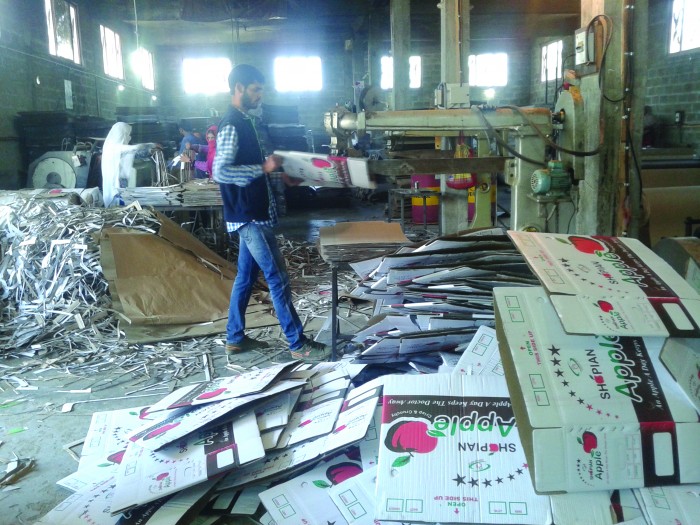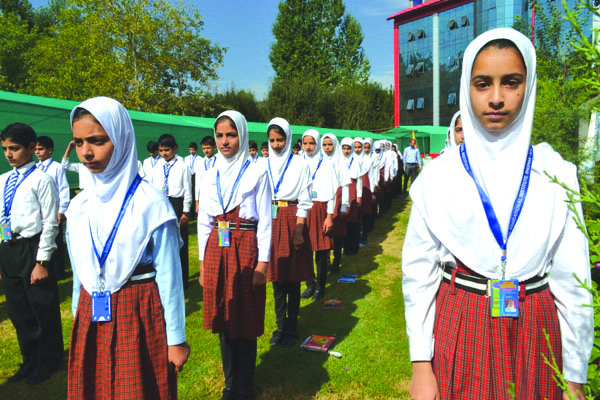The Mughal route town of Shopian is a booming economic centre. Producer of the best apples from the region, its business got impetus after a series of financial interventions five years ago. Smallest in 22, it is now J&K’s first district that exhibits phenomenal credit growth. Bilal Handoo meets the faces that make Shopian a grand success

Behind Kashmir’s southern apple town’s cash crop is its phenomenal cash appetite. This makes Kashmir’s youngest and smallest district to bank briskly on 33 outlets of eight banks in Shopian. But not all the money availed by its people is local. Banks, operating in the district, over achieve the credit deposit ratio to meet its soaring demand. This ‘money trading’ makes Shopian to avail highest advances in entire Jammu and Kashmir writing, thereby, apple town’s new growth story.
To add more colour to the story, upbeat locals like Sajad Hussain are at work 24 x 7. Sajad’s transition from a private teacher to a millionaire entrepreneur is talk of the town. It took this first generation manufacturer five years to establish Kashmir’s unique printing press, Rahat Print Packs, employing 25 locals.
For Hussain, it all started with a dream – the dream to put Shopian on the industrial map. There was no giant leap involved. He along with his brother Suhail first started Shopian’s “first ever offset” printing press from a shop. The former teacher knew it well that big dreams either started from shops or from garages, like Apple and Google. It was just a matter of time before he came out of a shop and succeeded. But before that, financial hiccups proved to be a stumbling block. To overcome that, one day Hussain approached the local bank to avail credit facility.
He then moved to Shopian Industrial Estate, where he set up his unit equipped with pre-press, press and post-press facilities. Inside the unit spread over 2.5 kanals, twelve machines including two imported from Germany got installed over the period of time. “It is the only unit in entire Kashmir performing all three functions (pre-pressing, pressing and post-pressing),” he claims. “Printing is still rarely done in Kashmir. Delhi still caters to 99.99 percent of our printing needs. I have just diverted a fraction of that traffic to my unit and I am already a busy man.” Hussain is also into packaging business.
Printing and manufacturing cardboard boxes make him a distinct player in Shopian. Major local shops are flooded with his cardboard boxes. This has apparently cut down the market dependence on traditional wooden apple boxes significantly. With an annual turnover between Rs 5 and 10 crores, Hussain also supplies his cardboard boxes to other markets in Kashmir. “Only that person is successful who can anticipate future,” Hussain asserts. “Years ago I could gauge the mood of market, and today, I am a contented man.”
On Shopian’s hilly terrains strewn with orchards, there seems no dearth of such success stories. One of the six former Wazarat Headquarters in Kashmir from 1872-1892 AD, the district avails Rs 805.74 crore bank credit annually, highest for any district in J&K.
The bank involvement has ended Shopian’s customary dependence on advances given by middlemen from Azadpur Mandi and local commission agents. Both of them used to control the nerve-centre of the local apple market by charging choicest interest rate on advances to growers. The serious dent to the duo’s position was the introduction of a Kisan Credit Card. KCC was an initiative introduced to help farmers, providing them affordable and adequate credit to fill the working capital gap requirement.
The cardholding orchardists can avail Rs 3 lakh per 9 kanals of land. “The scheme has greatly benefited the apple growers,” says Shahnawaz Khan, an apple grower of Shopian’s renowned orchardist clan. “It only charges 4 percent interest waiving off remaining 3 percent if grower pays loan within a year.”
Khan is the grandson of legendary orchardist, Haider Khan of Shopian’s Pinjora village. Khan Senior, owning a 1000 kanal orchard, is known for introducing many varieties of apple in Shopian. His grandson, Shahnawaz owns 50 kanals. Every season, Khan Jr. uses his KCC to groom his orchards for a full bloom. “Banks have revolutionized the concept of farming,” he says. “More than anything else, it has relieved horticulture sector from middlemen to a great extent.”
Besides financial schemes, opening of Shopian Fruit Mandi five years ago made the growers ‘master of their own crop’. “The best thing Mandi did was making the market open,” says Mir Muhammad Amin, president Shopian Mandi. “Earlier growers used to go to Azadpur Mandi to bargain with buyers, which isn’t a case anymore.” In previous season affected by deluge, Mandi registered a sale of around Rs 850 crore. The turnover benefited 350 commission agents, around 1,400 workers and 22,000 families linked with the market.
Lately, fading financial constraints have motivated growers to introduce scientific farming in their orchards. Khan is going for High-Density Planting System (HDPS). Apart from high yields, HDPS maximises the efficiency of costly farm inputs.
The cost effective farming has also surged Shopian’s bank deposits. In the last financial year, the district had net bank deposits of Rs 594.97 crores. The maximum amount of Rs 529.01 crores was with private banks of which J&K Bank is the major player, Rs 42.81 crores were with PSU banks and Rs 4.29 crores with Regional Rural Banks.
But not all advances in the district are orchard linked. Shopian’s Gen-X is also going for diversification. Two young men, Izhan Javed and Faisal Burza partnered to establish Integrated Pack House for fruits in Industrial Estate Lassipora in 2011. Their venture, Fruit Master, starting with Rs 40 crore has both cold storage and integrated controlled atmosphere facilities. “We do quality analysis of apples,” says Burza. “The capacity of our unit is 500 metric tonnes which remains booked with orders every season.”
The duo stores apples using technology interventions. Their facility, created with the help of bank advances, enhances market value of apples. “Once growers take their stock back in off season, say in April or May,” says Burza, “they then manage to earn more.” The duo says they are in partnership with growers and not directly into apple trading, which they believe, is a highly volatile market. Four years after establishing the facility, the two young entrepreneurs are pleased after treating Shopian apple, for good.
With economic change sweeping the district, perched in the foothills of Pir Panchal range, the banks have their cash counters constantly jingling. The Apple Bowl having two assembly segments, nine tehsils, eight blocks, 43 halqas and 231 villages avails Rs 753 crores advances from J&K Bank alone followed by Rs 17.51 crores and Rs 14.64 crores from SBI and HDFC banks respectively.
Known as the gateway of Kashmir for providing passage to a saint-scholar Mir Syed Ali Hamdani into Kashmir, the district consumes credit of Rs 443.98 crores in priority sector (including housing, education, etc). While the non-priority credit for the district fed by Hirpora stream, Rambiara Nallah, Romshi and Tongri streams stands at Rs 41.49 crores.

During his ongoing posting as J&K Bank branch manager, Ghulam Nabi Khan has lost the count of loans he has sanctioned in the district. Shopian, he says, houses 85 percent of apples grower population while as the town has nearly 95 percent population comprising of apple growers.” With the majority living in rural areas, a change in credit consumption has swept over. “Earlier,” says Khan, the bank manager, “all advances were taken for agricultural purposes but now other financial products like credit cards, car loans etc are also in great demand.” Interestingly, 2.66 lakhs people (census 2011) of Shopian having literacy rate of about 62.49 percent consume Rs 2.08 crore education credit and Rs 4 crore on housing.
Amid diversified credit demand, Shopian still consumes agricultural credit of Rs 357.17 crores. “Now around 15 percent population has diversified on face of horticulture losses they suffered in last three seasons,” the banker says. The diversification has spilled over to Mughal Road where a local, Ali Mohammad Danish is constructing first hotel with bank finance.
His hotel is coming on a highway of great historical importance across the Pir Panchal range. For constructing this piece of infrastructure on the stretch, Danish was sanctioned a loan of Rs 71 lakh by J&K Bank. He believes that he will end up creating a good staying facility at a picturesque location. But other than housing scenic spots like Sedow, Hirpora and Keller, today Shopian owns a notable school nestled close to orchards. Established by scion of an orchardist family, Rainbow School has come up on the scene in 2010.
Its owner, Sajad A Khan, an MPhil in business management wanted to move abroad but was advised by his elders to stay put and serve the education sector. He sold 24 kanals of his family orchards at a time when Shopian was rallying behind the call for justice in the infamous double rape-murder case in 2009.
By fall 2010, as the school started functioning, 160 students were enrolled. The roll has now reached to 950. “Every story takes its own time to take off,” says Sajad. By 2014, he availed bank advances to give facelift to his school spread over 23 kanals of land. “The timely assistance gave me a direction,” he says. “I think the decision to stay back was indeed right.”
Riding on similar success stories, Shopian seems well-placed on the growth curve. Last time when government abolished the toll tax at Lakhanpur, Shopian fruit growers blurted out, “Wow, what a practical relief!” In whispers now, people again talk about a new “practical relief” they ‘bank’ upon.
















I don’t even know the way I finished up here, but I believed
this submit used to be good. I do not know who you’re however definitely you are going to a famous blogger inn case you aren’t
already. Cheers!